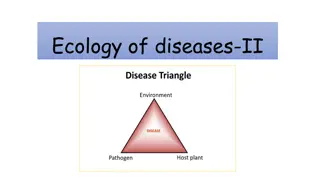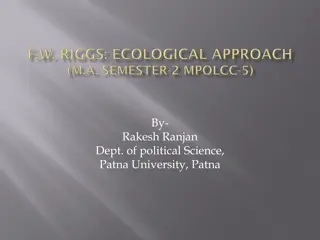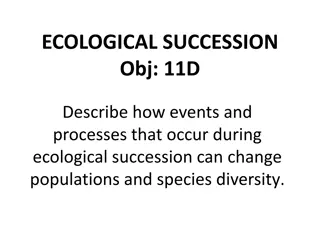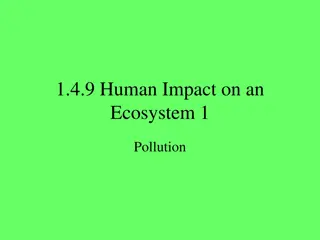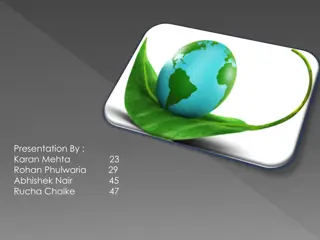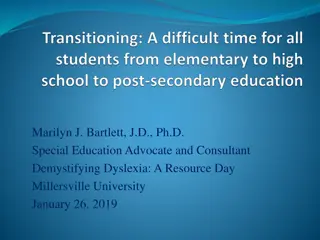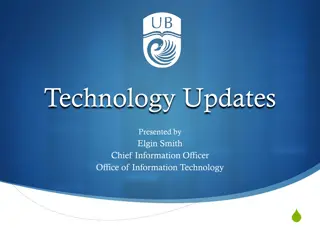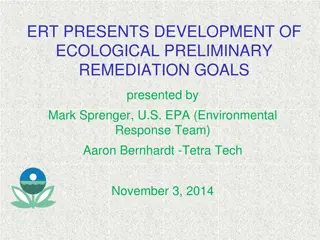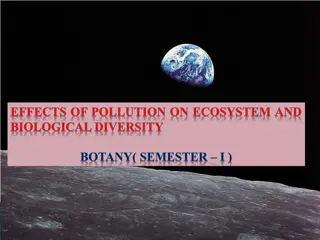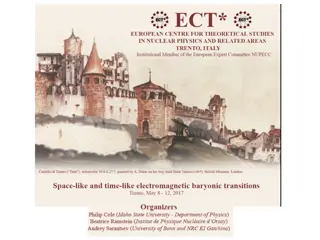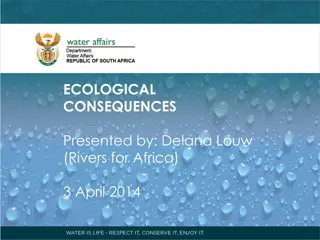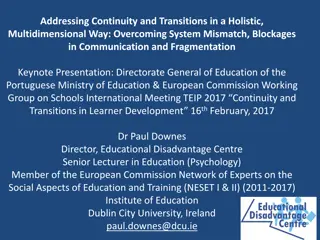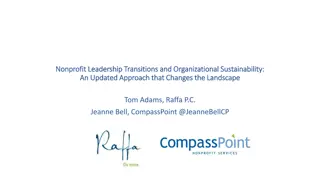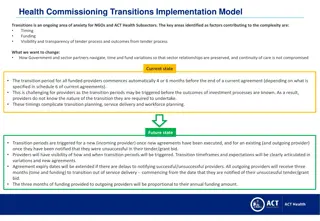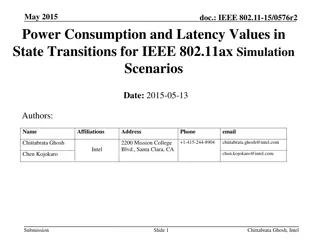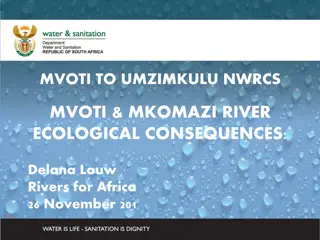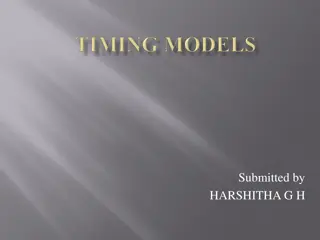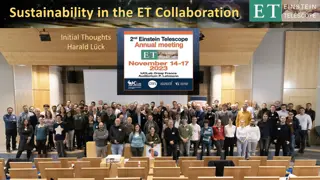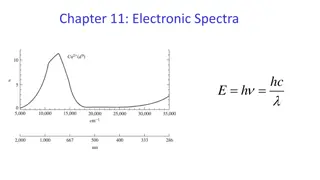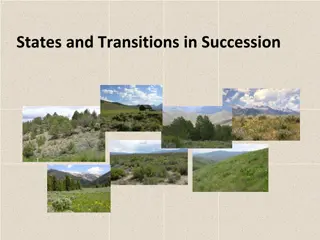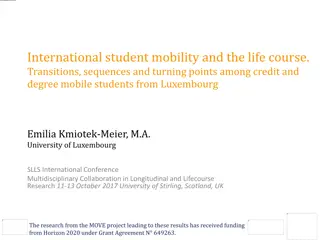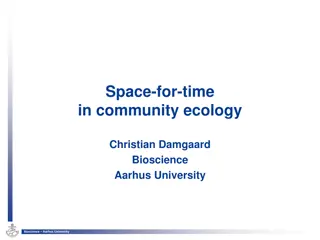Interpersonal factors and their impact on pain transitions
Exploring the impact of interpersonal factors on pain transitions, this research delves into the communication and behaviors between individuals experiencing pain, such as parent-child relationships and interactions with healthcare providers. The study analyzes psychosocial mechanisms influencing pa
3 views • 24 slides
Understanding Models with False Positive Detections in Occupancy Modeling
Explore the importance of addressing false positives in occupancy modeling, potential biases caused by them, methods to mitigate errors, and the extension of basic occupancy models to allow for false positives. Key concepts such as the Royle-Link model and the integration of classification processes
11 views • 33 slides
Overview of Ecological Studies in Epidemiology
Ecological studies in epidemiology involve studying groups of individuals at a population level to examine the correlation between exposure and disease occurrence. While cost-effective and useful for generating hypotheses, ecological studies have limitations, such as the inability to control for con
3 views • 21 slides
Understanding Ecological Relationships and Food Chains
Explore the intricate ecological relationships in nature, including population dynamics, producer-consumer systems, and different types of consumers like herbivores, carnivores, and decomposers. Learn about food chains, food webs, and the interconnectedness of organisms in ecosystems through informa
0 views • 38 slides
Understanding Panel-to-Panel Transitions in Comics with Examples from "The Magic Fish
Explore the world of panel-to-panel transitions in comics through Scott McCloud's six basic types: Moment-to-Moment, Action-to-Action, Subject-to-Subject, Scene-to-Scene, Aspect-to-Aspect, and Non-Sequitur. Discover how these transitions impact storytelling and engage readers using examples from "Th
1 views • 9 slides
Understanding Ecosystems and Disease Ecology
Explore the diverse types of ecosystems, including autochthonous, anthropurgic, and synanthropic ecosystems, and their impact on disease ecology. Learn about biotopes, biocenosis, ecological mosaics, and ecological interfaces, and discover how infectious diseases can be transmitted across these inte
0 views • 10 slides
Understanding Landscape Architecture: Designing Outdoor Environments
Landscape architecture involves the art and practice of designing outdoor spaces to harmonize with buildings, roads, and natural surroundings. It is a comprehensive discipline that encompasses land analysis, planning, design, management, and preservation, creating healthy and enjoyable spaces for th
1 views • 23 slides
The Ecological Approach in Comparative Public Administration
Fred W. Riggs, a proponent of the Ecological Approach in Public Administration, emphasized the importance of understanding the interaction between administrative systems and their external surroundings. He introduced the Fused-Prismatic-Diffracted Model to explore the unique contexts of developing c
0 views • 21 slides
Understanding Ecological Succession and Its Impacts
Ecological succession is the orderly process of change in an ecosystem, where one community replaces another until a stable climax is reached. This progression affects populations and species diversity. The process involves primary and secondary succession, with events like tornadoes, hurricanes, an
0 views • 23 slides
Understanding Pollution and its Ecological Impact
Pollution is any human addition to the environment that disrupts the ecosystem's ability to sustain life. This includes pollutants like CO2 and chemicals from various sources that harm air, water, and land. Different types of pollution such as industrial, agricultural, and domestic pollution have ad
0 views • 25 slides
Understanding the Relationship Between Ecology and Business
Ecology and business have a complex relationship where human activities impact the ecological environment, and in turn, the environment influences our quality of life. Maintaining ecological balance is crucial for sustainable development, and businesses play a significant role in ensuring environmen
0 views • 19 slides
Understanding Ecological Niches in Advanced Biology
In Advanced Higher Biology, the concept of ecological niches is explored in depth, considering both abiotic and biotic factors that impact an organism's role in its environment. The fundamental and realized niches are distinguished, along with the Competitive Exclusion Principle and examples like sq
4 views • 18 slides
Navigating Transitions in Special Education Advocacy
Special Education Advocate Marilyn J. Bartlett, J.D., Ph.D., discusses the importance of preparing for transitions in education for students with dyslexia. The presentation covers legal requirements, transition services, and the role of schools in facilitating successful transitions at various stage
0 views • 50 slides
Information Technology Updates and Transitions
Stay informed about the latest technology updates and transitions presented by Elgin Smith, Chief Information Officer. Updates include architecture enhancements, fiber expansion, support services strengthening, and transitions to new systems like Banner and Elevate. Get ready for the future of techn
0 views • 5 slides
Eco-Remediation Goals Development Training Overview
This presentation by Mark Sprenger from the U.S. EPA discusses the development of Ecological Preliminary Remediation Goals (PRGs). It covers the process steps, assumptions, risk information activities, and resources related to ecological risk assessment within the EPA's programs. The training module
0 views • 53 slides
Analysis of Contrasts and Transitions in "Sir Gawain and the Green Knight
In "Sir Gawain and the Green Knight," the narrative complexity is evident through contrasting themes and transitions between different story strands. The poem explores contrasts such as outside/inside and active/inactive, reflecting deeper symbolic meanings. The transitions play a pivotal role in sh
0 views • 22 slides
Understanding Biological Diversity and Ecological Organization
Exploring the intricate balance of flora and fauna on our planet, this content delves into the vast array of plant and animal species coexisting in various ecosystems. It discusses the significance of biodiversity, the interaction of biotic and abiotic components in ecological systems, and the ecolo
0 views • 41 slides
Supporting Transitions and Responsive Environments for Effective Planning
Delve into the key aspects of supporting transitions and ensuring responsive environments in educational settings. Explore strategies, define transitions, implement plans, and value visuals to create a balanced, flexible, and predictable routine. Reflect on activities and relationships to foster a s
0 views • 15 slides
Effective Techniques for Using Transitions in Public Speaking
Learn how to effectively use transitions in public speaking to connect ideas, enhance understanding, and maintain audience engagement. Discover the importance of verbal bridges between ideas and how to smoothly transition between main points and subpoints in your speech. Explore techniques for creat
0 views • 14 slides
Understanding Adolescent Psychology: Development, Transitions, and Puberty
Exploring the complexities of adolescence, this content delves into the various phases and transitions young individuals experience during this critical period. Topics covered include biological, cognitive, and social transitions, puberty, the endocrine system's role in development, and somatic chan
0 views • 33 slides
The Role of Guarantee Institutions in Supporting European SMEs
Guarantee institutions play a crucial role in facilitating access to finance for SMEs in Europe. With 46 members across 31 European countries, these institutions provide new guarantee production, support SMEs with outstanding guarantee volumes, and offer dedicated products for sustainable and digita
0 views • 16 slides
Advances in Baryon Spectroscopy and Hadronic Matter Studies
Discussions at the meeting focused on interpreting HADES results for e+e- and meson production in hadronic reactions, with studies involving proton, pion, light, and heavy ion beams. The role of time-like electromagnetic transitions, baryon spectroscopy, and connecting hadronic matter studies were e
0 views • 12 slides
Understanding Ecological Consequences in Ecosystem Management
Delana Louw from Rivers for Africa presented on the ecological consequences of various scenarios in ecosystem management. The process involves delineating units of analysis, stakeholder engagement, quantifying ecological water requirements, evaluating scenarios, and determining management classes. B
0 views • 14 slides
Addressing Continuity and Transitions in Education Systems
Overcoming challenges in education transitions requires a holistic, multidimensional approach to address system mismatch, communication blockages, and fragmentation. Strategies for learner development, inclusive supports, and preventing early school leaving are vital. Progress in Portugal shows impr
0 views • 53 slides
Nonprofit Leadership Transitions for Organizational Sustainability: An Updated Approach
Explore the evolving landscape of nonprofit leadership transitions and organizational sustainability with a focus on the executive search and transition process. Learn about the importance of leader development, organizational sustainability, and how to navigate inevitable transitions in a changing
0 views • 12 slides
Supporting Transitions for Vulnerable Learners Returning to School
Orkney Islands Council's Educational Psychology Service has developed guidance and provided professional learning to support transitions for vulnerable learners, including children and young people with complex learning needs. The focus is on creating a flexible and protracted transition process tha
0 views • 16 slides
Improving Health Commissioning Transitions for NGO and Health Sectors
Addressing the challenges in transition periods for health service providers by ensuring clearer communication, adequate time for transitions, and transparent funding processes to maintain sector relationships and continuity of care. The current state involves automatic transition triggers before ou
0 views • 5 slides
Health Commissioning Transitions Implementation Model Overview
The Health Commissioning Transitions Implementation Model aims to streamline the transition process for service providers in the ACT government's health sector. The model outlines clear timelines, expectations, and procedures for both Preferred and Non-Preferred Respondents, ensuring a smooth and ef
0 views • 8 slides
Power Consumption and Latency in IEEE 802.11ax State Transitions
This document discusses power consumption and latency values in state transitions for IEEE 802.11ax simulation scenarios. It covers power states definition, common power model parameters, and state transitions within the simulation scenarios. The transitions include Transmit to Listen, Receive to Li
0 views • 9 slides
Ecological Consequences Assessment for Conservation Areas
Determining the ecological consequences of various scenarios is crucial for conservation efforts. The assessment focuses on changes in geomorphology, physico-chemical properties, fish populations, macroinvertebrates, and riparian vegetation. By evaluating scenarios based on ecological significance,
0 views • 11 slides
Understanding Timing Models in Cell Design Environments
Delve into the intricacies of timing models for cells in design environments, exploring factors affecting delay, output transitions, linear and non-linear models, and the use of table models in cell libraries to specify delays and timing checks. Discover how input transitions and output capacitance
0 views • 11 slides
Sustainability Challenges in ET Collaboration: Addressing Ecological and Non-Ecological Aspects
The ET Collaboration is realizing the importance of sustainability, encompassing ecological and non-ecological aspects. Issues include balancing energy consumption and hardware longevity, remote access possibilities, funding sustainability, social partnerships, and designing instruments with sustain
0 views • 5 slides
Understanding Electronic Spectra and Transition Metal Complexes
Explore the world of electronic spectra, absorption bands, and transition metal complexes through various diagrams and explanations covering topics like d-d transitions, free ions, microstates, and charge transfer transitions. Discover the reasons behind the coloring of octahedral compounds despite
0 views • 22 slides
Understanding Plant Community Succession and Ecological Transitions
Explore the dynamic process of plant community succession, from pioneer stages to climax communities, and the intricate patterns of transitions in ecological systems. Discover the variability and stability of different states within ecosystems, highlighting the complexities of natural ecological dyn
0 views • 14 slides
Understanding Ecological Goods and Services from Our Oceans
Explore the importance of ecological goods and services provided by oceans in Lesson 2 of the Oceans for Beginners curriculum. Learn about the tangible products, benefits, and services derived from ocean ecosystems, and reflect on their significance. Understand the categories of ecological services
0 views • 15 slides
Overview of Democratic Transitions and Revolutions
Explore the historical context of democratic transitions from the 1940s to 2020, including the waves of democracy as described by Huntington. Learn about bottom-up and top-down transitions, exemplified by mass protests in East Germany leading to German reunification. Delve into the complexities of p
0 views • 73 slides
Insights into Student Mobility and Life Transitions among Credit and Degree Mobile Students from Luxembourg
Explore the research findings from the MOVE project, focusing on international student mobility, transitions, sequences, and turning points among credit and degree mobile students from Luxembourg. The study delves into factors influencing student mobility, experiences, and employability, shedding li
0 views • 12 slides
Analyzing Edward Abbey's Mountain Lion, Weeds, and Roses
Abbey's essay on encountering a mountain lion is analyzed for its use of shifts, transitions, and philosophical reflections. Feedback is given on areas of improvement such as making solid transitions, enhancing introductions, and improving thoroughness. The essay's structure, use of transitions, and
0 views • 27 slides
Understanding Space-for-Time Substitution in Community Ecology
Space-for-time substitution (SFT) is a method used to study slow ecological processes by assuming different sites are at various stages of development. This approach, famous for its role in ecological development, has been critiqued for its implicit use in testing hypotheses on ecological processes
0 views • 7 slides
China's Health Transitions: Diseases of Poverty and Affluence
China's health transitions encompass changes in medicine and population health, influenced by factors like demographic shifts, disease patterns, and societal determinants. Challenges with data accuracy and the country's 20th-century demographic evolution are highlighted, including issues related to
0 views • 15 slides





